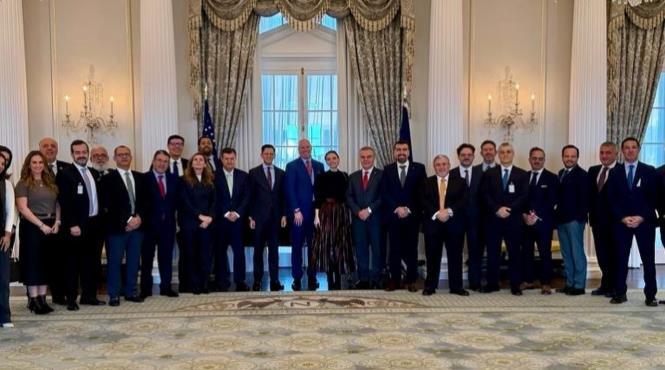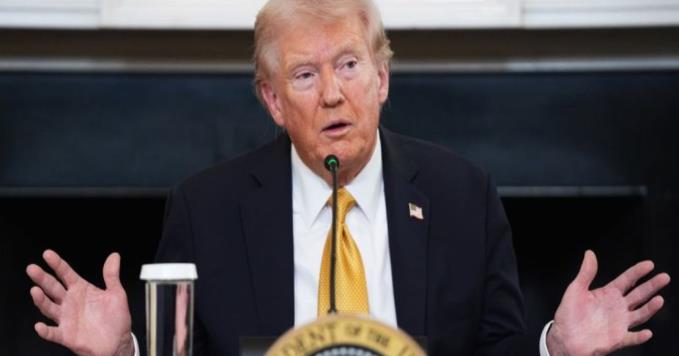






October 24th, 2025








October 24th, 2025
President Donald Trump signed a proclamation imposing new 25% tariffs on imports of trucks and components such as engines and transmissions, and a 10% tariff on buses, effective November 1st. While the measure includes a system of discounts for Mexico and Canada, under the USMCA, the tariff will only apply to the non-U S content value The decision, according to the US government, is part of Trump’s broader effort to strengthen U S manufacturing and reduce dependence on foreign suppliers. For Mexico, the move is particularly relevant, as the country is currently the US's top truck exporter a position that highlights its deep integration in North American supply chains.
Source: EL ECONOMISTA



U.S. President Donald Trump announced the suspension of trade negotiations with Canada, in response to a campaign ad released by Ontario’s government that used a 1987 Ronald Reagan speech criticizing tariffs without authorization Trump accused Canada of using the ad to “interfere” with U S judicial decisions The move further strains a relationship already burdened by high U.S. tariffs on Canadian exports. The suspension is unlikely to be permanent, as both sides face pressure to stabilize North American supply chains ahead of the 2026 USMCA review, but the episode adds new uncertainty to the regional trade outlook. For Mexico, this development is significant as the country seeks to maintain the current structure of the USMCA and this could be perceived as a potential threat to the stability the framework, especially considering Trumps proposal to shift toward bilateral arrangements
Source: CNN
Representatives from Mexico’s Business Coordinating Council (CCE) and the Business Advisory Council (CADERR), led by Francisco Cervantes and Altagracia Gómez, respectively, met with U.S. officials, legislators, business organizations, and labor unions in Washington, D.C., as part of a three-day working visit from October 20th to 22nd. The meetings aimed to highlight the complementarity between the Mexican and U.S. economies and to present a unified message from the Mexican private sector ahead of the 2026 review of the United States-Mexico-Canada Agreement (USMCA). The joint participation of business leaders and government representatives underscored Mexico’s intention to build confidence with U.S. counterparts before formal USMCA talks begin in 2026
Source: EL UNIVERSAL


During his appearance before the Mexican Congress’s Political Coordination Board, Secretary of Economy, Marcelo Ebrard, announced that Mexico and the United States have held 85 meetings related to tariffs and the upcoming USMCA review, with negotiations now 90% complete. He confirmed that discussions will continue next week in South Korea, on the sidelines of the APEC Leaders’ Summit, coinciding with the expiration of the 90-day deadline set by U.S. President Donald Trump to prevent new tariff hikes on Mexican imports Optimism within the Mexican government was reinforced by Foreign Trade Undersecretary, Luis Rosendo Gutiérrez, who said both countries will announce a series of agreements on security, fentanyl control, migration, and trade in the first days of November. He emphasized that the meeting in Seoul will serve to finalize the discussions and consolidate achievements. Also, Trump recently expressed satisfaction with Mexico’s efforts to address insecurity and drug trafficking. This tone of mutual acknowledgment suggests that, despite ongoing challenges, both governments are eager to frame the negotiations as a success ahead of the 2026 USMCA review
Source: EL ECONOMISTA


Over the past days, the Secretary of Economy organized sectoral meetings to build a broad national stance ahead of the 2026 USMCA review, across different states. These discussions included representatives from the private sector and labor organizations, marking the first time that the labor movement has been formally consulted in this process. Their inclusion is particularly relevant given that labor issues, such as the proposed reduction of the workweek to 40 hours, are among the top priorities on the legislative agenda in the coming months This move also reflects a clear effort by the federal government to demonstrate openness toward the labor sector, positioning itself as an ally, particularly, ahead of the USMCA review.
Overall, the sectoral meeting are viewed as a proactive step by the federal government to incorporate diverse perspectives into Mexico’s position, reinforcing national unity and credibility in trilateral talks.
Source: MILENIO
United States and Mexican authorities are investigating U S businessmen for fuel smuggling, with arrest warrants already moving through Mexican courts as of October 24th, 2025. The cases are focused on illegal fuel entering Mexico from the U.S. The probe includes potential links between U.S. companies and criminal organizations involved in fuel trafficking, This joint investigation signals deeper security cooperation between Mexico and Washington and reflects U S pressure for Mexico to show progress in reducing crime indicators
Source: LA JORNADA
Bill with Draft Decree Adding a Section XXXIV to Article 132 of the Federal Labor Law Regarding Paid Leave for Pet Care
• Presented by: Senator Sasil Dora Luz De León (MORENA)
• Objective: To establish an employer obligation to grant employees, upon justification, up to two paid working days per year for urgent pet care.
• Status: 2025-10-22 –Published in the Parliamentary Gazette
Bill with Draft Decree Amending Articles 132 and 994 of the Federal Labor Law Regarding Menstrual Health
• Presented by: Senator Imelda Margarita Sanmiguel (PAN)
• Objective: To require employers to grant women menstrual leave without affecting labor rights: up to two working days per month upon request, or up to five with medical certification.
• Status: 2025-10-21 –Published in the Parliamentary Gazette
Guidelines for the Implementation of the National Model to Eliminate Bureaucratic Procedures
• Presented by: Digital Transformation and Telecommunications Agency
• Objective: To reduce bureaucracy, streamline administrative processes, and facilitate individuals’ access to rights and compliance with legal obligations through more efficient, transparent, and user-centered digital mechanisms.
• Status: 2025-10-23 –Published in the Official Gazette of the Federation
Bill with Draft Decree Issuing the General Law to Prevent, Investigate, and Sanction Crimes of Extortion and Amending Various Federal Laws
• Presented by: Federal Executive
• Objective: To establish a unified legal framework to combat extortion through standardized definitions, jurisdictional rules, and penalties. The bill provides for official investigation, coordination among authorities, and stricter sanctions.
• Status: 2025-10-20 –Published in the Parliamentary Gazette

Fifth Resolution of Amendments to the General Rules of Foreign Trade for 2025 and Annexes 1, 2, and 5
• Presented by: Secretary of Finance and Public Credit
• Objective: To disclose amendments regarding suspension causes in registries, authorizations, and extensions for the import and export of goods, including temporary imports for the 2026 FIFA World Cup. It updates requirements, conditions, and annexes for maintaining or cancelling permits related to hydrocarbons, petroleum products, petrochemicals, and sulfur.
• Status: 2025-10-21 Published in the Official Gazette of the Federation.
Bill with Draft Decree Amending, Adding, and Repealing Various Provisions of the Customs Law
• Presented by: Senate
• Objective: To modernize the customs legal framework to strengthen tax collection, combat evasion, and enhance foreign trade competitiveness. The decree takes effect on January 1, 2026.
• Status: 2025-10-21 –Approved, sent to the Federal Executive (PUBLICATION IS PENDING)

